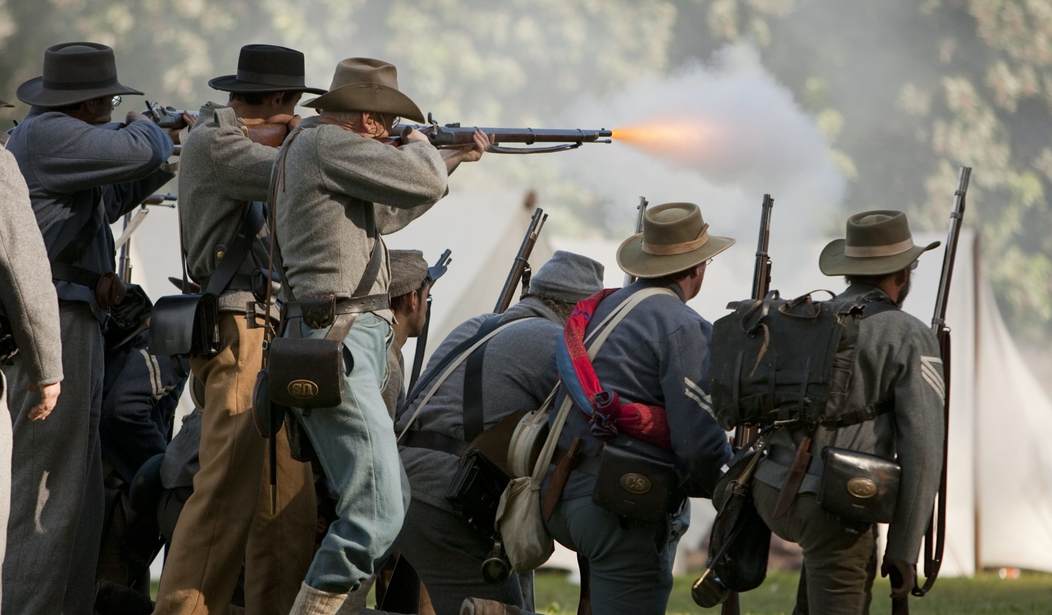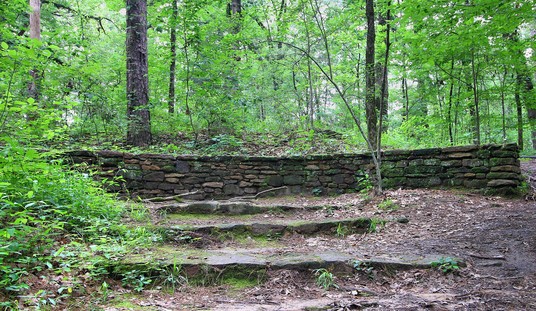July 1-3 is the 155th anniversary of the bloodiest battle ever fought in the Western Hemisphere: Gettysburg. In the first three days of July in 1863, some 52,000 Americans were killed, wounded, or went missing. The Union Army of the Potomac (about 90,000 troops) led by General George Meade clashed in a titanic battle with the Confederate Army of Northern Virginia led by General Robert E. Lee.
Gettysburg is the battle that almost every Civil War nerd (like me) loves to study because of so many “what ifs” and twists and turns. It could have gone so many different ways. However, I also love studying this battle because of the life lessons we can learn from the fascinating circumstances and the very fine men who fought on both sides. Here are a few life lessons we can learn today:
1. The small things count.
Gettysburg began by “accident” because some Confederate infantrymen were looking for shoes in that little town. No one planned on a battle there that day. Both armies had been looking for each other. Contact was made in the early morning hours of July 1 when some of Henry Heth’s troops looking for shoes (thousands of Lee’s troops were barefoot) “bumped into” John Buford’s Union cavalrymen. Word went out to both armies and within hours troops came pouring in from every direction.
That little search for something as insignificant as shoes turned into the bloodiest battle of the Civil War.
On the second day of the battle, Confederate infantry was to assault the far-left wing of the Union army. The hill known as Little Round Top was unoccupied. If the Confederates could take that hill then they could flank the entire army of the United States and possibly win the battle.
The men of the 15th Alabama Infantry and supporting units at first scrambled up Big Round Top. The temperature was in the low 80s but it probably felt hotter to all those troops clothed in wool uniforms and with a battle raging around them. They had been marching all day to get into position to fight, and they had given all their canteens to a few men to get water. Those men with the canteens were all captured by Union cavalrymen. Now, the Confederates climbing Big Round Top had no water to drink. When they reached the summit, they took a break for about 10 minutes.
While the Confederates were climbing the hill the Union general Warren realized they had left Little Round Top unoccupied! He quickly ordered the troops of Colonel Joshua Chamberlain’s 20th Maine to occupy that critical position. In the 10 minutes that the Confederate troops were resting, the Union was fortifying the hill the Confederates needed to take.
The 15th Alabama, along with the 4th and 5th Texas launched their attacks against Chamberlain’s men on Little Round Top, but it was too little too late. If only they had not stopped to rest for 10 minutes, if only they had not been parched and sapped of strength for lack of water, if only they had been joined by one more Confederate regiment … but the 20th Maine fought them off and the Union was able to hold that critical hill.
Colonel William Oates of the 15th Alabama recalled many years later that “great events sometimes turn on comparatively small affairs.”
During the third day of battle, when Lee ordered “Pickett’s Charge” of some 12,000 Confederate infantry, he preceded the assault with an artillery barrage. His cannons missed the Union lines, shooting over them, and consequently did not take out the Union infantry. Were the Confederate artillerymen just really bad shots? No. Besides the fact that it’s difficult to see over a mile away when the field is filled with smoke from 150 cannons, we now know that the fuses they were using for their cannon shells were from factories in Charleston and Selma (fuses they did not normally use).
These fuses burned for just one extra second, making the cannon balls explode later … just long enough for them to blow up BEHIND the Union lines on July 3, 1863, and not on the Union infantrymen. Small things indeed matter.
2. Communicate properly.
One of General Lee’s biggest problems throughout the Gettysburg campaign was that he simply did not communicate exactly and completely with his generals. His chief of cavalry, “J.E.B.” Stuart, was off riding around the Union army and generally creating havoc against the enemy, but without his cavalry Lee was essentially blind. He did not know where the enemy was or how many troops he faced. His vague orders to Stuart gave the cavalry commander the liberty to go off and “do his own thing.”
That lack of command on Lee’s part cost him dearly. On the first day of battle the Union army was in full retreat. The Confederates were on a roll and all they had to do to seal the deal was continue the attack and drive the Union forces off Seminary Ridge. General Lee saw this moment of opportunity and told his Second Corps commander, Richard Ewell, to “take that hill if practicable.”
What do you mean “if practicable”? If it’s not too hard? If it seems like it’s a good idea that day? Again, Lee was too vague. He should have said, “Take that hill at all costs!” But he did not, and the opportunity to win was frittered away by his non-aggressive field commander.
Here is General Isaac Trimble exploding in frustration to General Lee over the failure to take Seminary Ridge on the first day (from the 1993 movie “Gettysburg“):
3. Be merciful.
One of my favorite stories from Gettysburg is that of General Gordon giving aid to his enemy, General Barlow. I fully realize that this story has come under fire in the past 30 years and some historians have called it “myth.” However, here is a scholarly rebuttal to that charge.
On the first day of the battle, Confederate General John Gordon of Georgia saw the Union General Francis Barlow of New York fall in battle. Gordon’s forces drove the Union troops back, and Barlow lay wounded on the ground. Gordon saw a Union general on the ground, dismounted, and quickly gave him aid (water and brandy). He summoned his medical staff, who rescued the critically wounded Union general. And that was the last Gordon saw of Barlow. It turns out, however, that Barlow recovered and fought in several more battles during the war.
Many years later, they met at a party. Gordon was now a U.S. senator from Georgia and Barlow was a successful lawyer. They each thought that the other had been killed in the war! Imagine their surprise when they “found” each other alive and well at that party! Gordon asked, “Are you the Barlow who was wounded at Gettysburg?” Barlow asked, “Are you the Gordon who gave me aid?” That started a friendship that lasted until Barlow’s death many years later. There was mercy to a fallen foe, even in the heat of battle.
4. Be humble.
I can think of many leaders of the Civil War who were modest, humble men (Lee, Grant, “Stonewall” Jackson for starters). Abraham Lincoln, however, tops the list when I think of Gettysburg. He was not present at the battle, of course. But a little over four months after the battle he came to that town to help dedicate the cemetery and deliver the now famous “Gettysburg Address.”
He was not the main speaker that day! A famous orator, Edward Everett, was the main speaker … and man did he speak! Mr. Everett’s speech was two hours long! Then Lincoln got up. He spoke for about two minutes. And in those two minutes he spoke some of the most poetic, stirring, sublime truths ever uttered.
Even if you are not a Lincoln “fan,” you cannot help but tremble when you read the Gettysburg Address. The whole speech is about the sacrifice of the soldiers and the urgency of the cause of the United States. He even says that the world will little note what he says there … I chuckle every time I read that.
I doubt he thought that his short speech would become the greatest American speech ever. His words sink down deep into our souls … because we know Lincoln had a humble spirit when he wrote it and delivered it.
5. Be courageous.
The Battle of Gettysburg is the story of one courageous man after another. Both armies were filled with men of valor. Ever since I was a little boy I thrilled to hear the stories of men on both sides who fought with incredible bravery and honor.
My favorite story, however, is that of Colonel Joshua Chamberlain and his men of the 20th Maine who fought on Little Round Top. He had fewer than 200 troops. He was facing an attack of well over 1,000 in his sector. Chamberlain was given orders that they could not retreat. They could not surrender. They had to fight to the death that day. It would be their last day on earth.
When I tell this story to school kids (I’m all dressed up in one of my Civil War uniforms), I get to this point in the story where Chamberlain and his men run out of ammo and I ask the kids, “What would you do? It all comes down to just you now. Are you gonna run away and cry to mama? Or are you gonna fight?”
I’ll never forget one little girl in the fifth grade, looking at me with all the determination in the world, shouting in class: “I’m not running away! I’m gonna FIGHT!” I smiled and said, “I know you will. You’ll fight just like Colonel Chamberlain!”
Then I go on and tell the kids the rest of the story of how he launched a bayonet charge and saved the United States that day. Here’s his famous charge from the movie Gettysburg:
There will be times when we will be outnumbered. We will be “out of ammunition.” The temptation will be great just to chuck it all and give up. But Chamberlain inspires me to dig deep, “fix bayonets,” not give up … and charge.
6. Take responsibility.
General Robert Lee, often maligned in these “politically correct” days, was truly a man of integrity. He ordered the largest infantry attack at that time, now known as “Pickett’s Charge” (named after General George Pickett). The attack was a colossal failure, resulting in over half the force being wiped out by the Union army.
Many men would try to pawn off the failure onto others. Maybe the troops were not brave enough or quick enough. Maybe the generals did not obey Lee’s orders fast enough … or misunderstood him. No, Lee would never blame others for mistakes that he knew were entirely his. That is why he rode out to his troops and told them that it was all his fault. He took ALL the blame. He later wrote a letter of resignation to President Jefferson Davis (Davis refused the resignation).
Do we have men and women in leadership today who take such responsibility for failure? I hear politicians whine excuses after excuses, but rarely do I hear a real person of integrity say, “Yeah I screwed up. It was all my fault and no one else’s.”
Lee’s men loved him even more because they knew that in him, for better or for worse, they were following a real man who was full of integrity; not hot air.
I’m sure there are many other life lessons we could glean from this momentous battle, and from the whole war itself. God help us to learn good lessons, and not repeat the horror of a war that killed 700,000 of us, and left us scarred for generations.









Join the conversation as a VIP Member